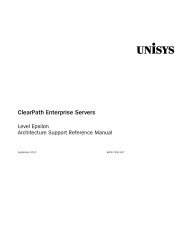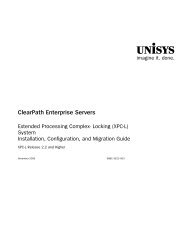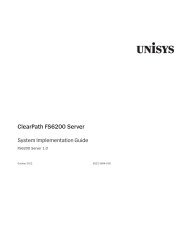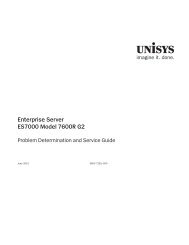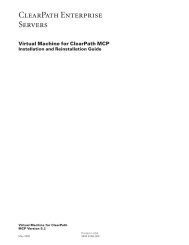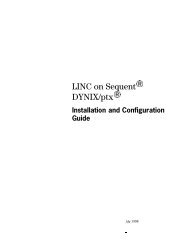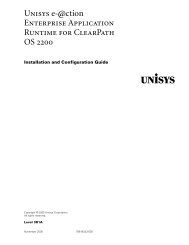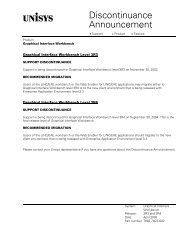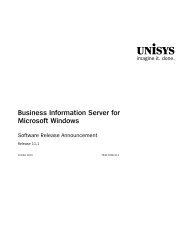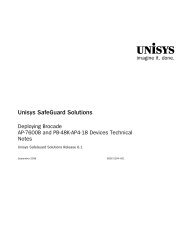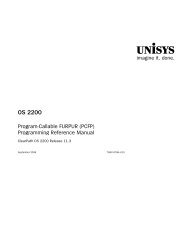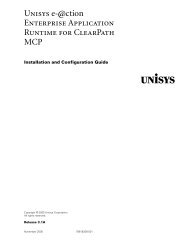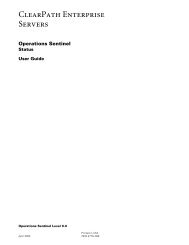Runtime for ClearPath OS 2200 Software Release Announcement
Runtime for ClearPath OS 2200 Software Release Announcement
Runtime for ClearPath OS 2200 Software Release Announcement
You also want an ePaper? Increase the reach of your titles
YUMPU automatically turns print PDFs into web optimized ePapers that Google loves.
<strong>Release</strong> Functionality<br />
Database Per<strong>for</strong>mance Enhancements<br />
Direct Specification of RDMS Storage Attributes<br />
You can directly specify RDMS storage attributes controlling the allocation of space <strong>for</strong><br />
structures in runtime systems through Developer 3.1A, which has new Advanced RDMS<br />
Options pages added to the Ispec and Profile Options dialog box. Frequently tuned<br />
storage parameters can be altered <strong>for</strong> Ispecs, Conditional Profiles, Profiles, Named<br />
Partitions, Ispec AutoIndexes and Conditional Profile AutoIndexes. Additionally, packs and<br />
populations can be entered <strong>for</strong> AutoIndexes.<br />
Users now have the option of directly specifying the maximum number of pages to be<br />
used <strong>for</strong> a storage area, as well as the page size <strong>for</strong> that storage area. Previously, this<br />
number was automatically calculated based on population and page size.<br />
Multi-thread Installation/Reorganization<br />
The install phase of a system generate can now be split into multiple streams, where you<br />
can nominate the number of parallel batch jobs <strong>for</strong> its database reorganization phase. The<br />
Multireorg feature enables <strong>OS</strong><strong>2200</strong> RDMS database reorganizations to run in multithread<br />
mode, i.e. more than one split run can be started up <strong>for</strong> the database reorganization<br />
phase. Through an option set in host Builder to use this feature, you can now specify a<br />
number of parallel reorganization activities within a generate, in the same way that the<br />
compile and link phases can be multi threaded. You may also spread the work among the<br />
split runs.<br />
Previously, if a number of structures in an <strong>OS</strong><strong>2200</strong> RDMS database were affected by a<br />
generate, the previous logic would single-thread the reorganization process. This process<br />
was time intensive if the structures involved a lot of data, increasing system down time.<br />
Thus, this feature reduces the database reorganization time <strong>for</strong> long runs and so reduces<br />
system down time.<br />
Support <strong>for</strong> RDMS XRLOAD Utility (Relational Database Fast Load)<br />
XRLOAD (Relational Database Fast Load) has been developed as an offline utility <strong>for</strong><br />
speedy loading of data. It allows RDMS database reorganization per<strong>for</strong>mance to be an<br />
order of magnitude faster than the alternative of using RDMSMUTL, especially when very<br />
large tables and Fastload reports are involved.<br />
While XRLOAD does not use RDMS, UDS or Integrated Recovery, and Fastload Reports<br />
do not support multi-table Ispecs, XRLOAD does construct database pages directly in the<br />
proper UDS and RDMS <strong>for</strong>mat.<br />
Support <strong>for</strong> KEYONLY; Commands<br />
Using KEYONLY; commands avoids accessing a whole table when only the profile<br />
ordinates are required. Doing so reduces I/O and there<strong>for</strong>e increases per<strong>for</strong>mance.<br />
4–6 78616414–000



